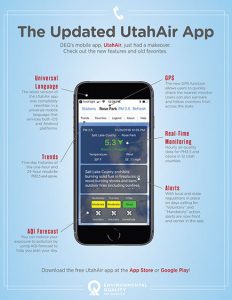The Utah Department of Environmental Quality’s Division of Air Quality (DAQ) reminds residents that wood-burning restrictions go into effect November 1, and urges Utahns to use online and mobile tools to monitor daily PM2.5 levels.
The fines for burning wood or other solid fuel devices on mandatory action days have increased to $150 for the first violation of the burning restrictions, and additional violations will be subject to increased penalties. The penalties reflect the need to address the levels of air pollution that wood stoves contribute in light of the reclassification of Wasatch Front counties as “Serious” non-attainment areas for fine particulate matter (PM2.5).
Wood-burning restrictions help reduce hard-to-see particle pollution that builds up during winter inversion periods. Restrictions are implemented as a proactive measure when fine particle matter (PM 2.5) has the potential to reach unhealthy levels from emission sources such as vehicles and wood- and coal-burning fireplaces or stoves.
Salt Lake County has implemented mandatory burn restrictions on days when DAQ calls for voluntary action.
UtahAir App

The DAQ air-quality alert system, developed with input from the public, provides information on the complex health implications and related activity restrictions triggered by certain air pollution levels. A phone app–UtahAir–uses DAQ’s air quality alert system. The free App is available for Android and iOS users. App users will receive action alerts and three-day forecasts to help plan the best times to exercise outdoors or when to consolidate trips based on current conditions.
“The UtahAir app is our most popular tool because Utahns can quickly click on the information they need at anytime and anywhere,” said Bryce Bird, director of DAQ. “This is important information people can access in order to make daily decisions that will improve air quality during the upcoming winter inversion season.”
Air-Quality Alert System
DAQ’s alert system consists of two parts:
Action Alerts
Three basic symbols indicate unrestricted, voluntary and mandatory actions.
- Unrestricted Action (circle): Wood- and coal-burning stoves or fireplaces may be used but in a proper manner to reduce smoke emissions.
- Voluntary Action (inverted triangle): Residents are asked, on a voluntary basis, to not use wood and coal burning stoves or fireplaces and reduce vehicle use by consolidating trips. Industry should optimize operating conditions to minimize air-pollution emissions.
- Mandatory Action (X): Residents are prohibited from using wood- and coal-burning stoves or fireplaces and asked to reduce vehicle use by consolidating trips. Industry should optimize operating conditions to minimize air pollution emissions.
When mandatory restrictions are in place, the use of solid-fuel appliances may result in penalties ranging up to $299 per day. If members of the public observe violations of the burning restrictions, they should report them to DAQ by calling (801) 536-4000 during business hours or by filling out a simple online form.

Health Guidance
The EPA’s national standard Air Quality Index (AQI) is divided into six, color-coded categories that correspond to different levels of pollution and related guidance for individuals with health concerns.
The DAQ monitors air pollution hourly and provides a three-day “action forecast” on its web page to help residents plan ahead and adjust their activities during winter inversions to protect their health. More information on air quality and health is available at the Utah Department of Health’s Asthma Program.
Additional suggestions on ways to reduce personal emissions during winter inversions are available in DAQ’s Inversion Toolkit.
